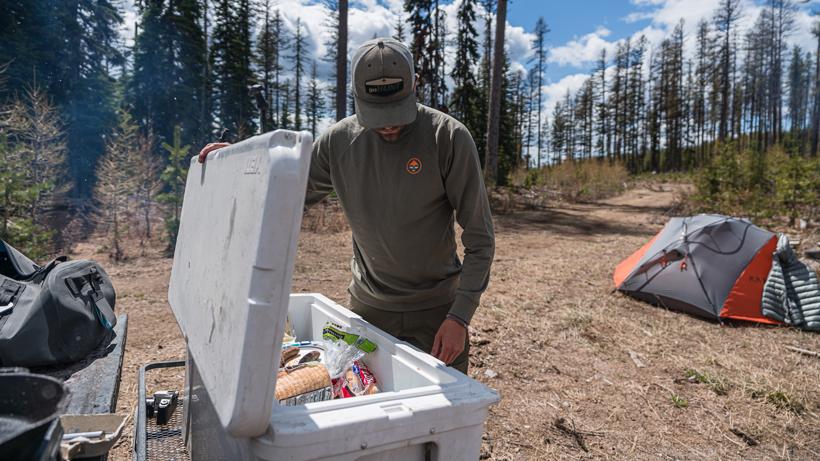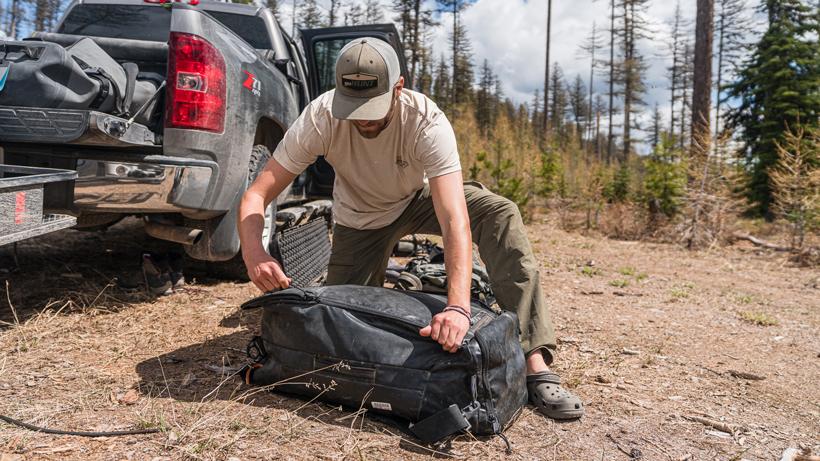






When I talk to hunters about camping and hunting out West, everyone thinks about bivy camping, spike camping or carrying camp on their back. This is a great way to save some energy, have a tremendous western mountain experience and increase your odds of harvesting an animal. However, camping in the wrong spot can have a reverse effect, spook all the game, blow out the basin and leave you with a bad western camping experience. When selecting a camping spot in the backcountry, there are a few important tips that will increase your experience and give you that edge up you are looking for.
Countless times I have hiked back multiple miles into a beautiful meadow where elk or deer have been seen feeding in years past only to find a tent smack dab in the middle of it. Yes, it’s a beautiful camping spot, but more importantly, it is a nighttime feeding spot for the exact game you are trying to hunt! I have also seen camps in some dense timber filled with elk sign, but struggle to find any elk because they have vacated the area once they felt the pressure of hunters. For this reason, my first piece of advice is to camp close, but not too close. It is better to be back a half-mile or more from the area that you expect to see the elk or deer than it is for you to be in their bedroom or kitchen all day and night. If you want the best hunting experience, give them their space to behave naturally. Instead of camping in an elky part of the basin, I always like to camp near the main trail, so other people know that I am in there when they hike in. I feel as though knowing someone is hunting the same area as you encourages them to be more respectful, which benefits all hunters.
When I think about camping back in a drainage or basin, I always like to preplan a spot that I feel would work. To plan this spot, I think about the thermals and what the animals do at night. For example, elk often head down to the bottom of a basin at night to feed and get water. Then, they feed up the side hill towards their densely forested bedding area in the morning. One might surmise that being on top of that mountain near where the elk want to be would be a great place to spend the night, but once you consider the thermals, you might think differently. At night, thermals are usually dropping down the mountain. It makes more sense to be down drainage where the nighttime thermals will carry your scent down and away from the elk rather than sleeping in the same drainage as the elk. Another option that is sometimes available is to camp up and over in the next drainage. Ultimately, the last thing you want is for your scent to drop right into the elk’s area and have them move out of your basin in the middle of the night.
Another important consideration when it comes to western camping is staying out of the wind. Though the wind on the mountains often dies down after dark, it is important to stay out of it as much as possible. Nothing can ruin your next few days of elk hunting like a lousy night of sleep, thinking your tent is going to blow off the mountain. Plan on staying out of the wind in a place where your thermals are heading away from the animals and you are trying to hunt.
The last consideration I always plan when picking a spot to camp is to stay out of danger. The most significant risk that I worry about when camping is bear activity and trees falling. To combat the bear activity, make sure you are following bear deterrent strategies when camping. This means cooking away from your tent, keeping your scented items strung up away from your tent and always having some bear spray or a firearm available just in case. When it comes to trees falling, I highly encourage everyone to look at the trees around them before setting up their tent. If the forest is full of deadfall, you might be wise to set up farther away from standing timber just in case. The last thing you want is to worry about every creaking tree sound or strong gust of wind throughout the night.
Camping in the backcountry can be a great experience, especially during the earlier seasons when the weather is mild. There is something about being under the stars, being in the wild and being near the game you intend to hunt that makes the hunt so much more rewarding. This fall, plan on a spike or bivy camping in the mountains to increase your odds. To pick a spot that helps and not hurts your odds, remember to stay back, watch the thermals, stay out of the wind and out of danger.